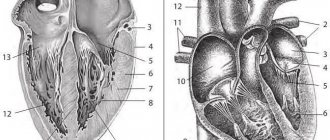Arterial hypertension of the 3rd degree is characterized by an increase in systolic pressure up to 180 mm R. Art. and diastolic – above 110 mm Hg. Art. In this case, blood pressure constantly exceeds the permissible norms and does not return to normal levels without drug treatment. The causes of stage 3 hypertension are varied: abuse of bad habits, obesity, sedentary lifestyle, endocrine disorders, hereditary predisposition.
The disease is accompanied by pronounced symptoms, which should be a reason to immediately visit a cardiologist. Treatment of the pathology is complex and carried out under the strict supervision of a specialist. Lack of therapy leads to serious complications affecting the heart, kidneys, brain, and visual system.
Degrees of hypertension and their characteristics
Arterial hypertension is a severe pathology, accompanied by an increase in blood pressure and the progression of associated complications. If the disease is advanced to stage 3, it is impossible to completely cure it, because the patient’s body is already accustomed to consistently elevated blood pressure. All his systems were rebuilt in a pathological way, regulating the processes of narrowing and dilation of blood vessels in a way that is not necessary.
Depending on the nature of the course and the degree of damage to the body, there are 3 stages of hypertension:
- First degree. The mild stage is characterized by an increase in tonometer readings to 140 – 159/90 – 99 mm Hg. Art. The course of the disease is unstable, accompanied by periods of remission and exacerbation. If you start treatment at the first stage, you can completely get rid of the disease and prevent its progression. Therapy consists of lifestyle changes and rarely involves the use of medications.
- Second degree. At this stage, the pressure rises to 160 – 179/100 – 109 mm Hg. The disease begins to manifest itself with pathological symptoms: painful headaches, discomfort and pain in the heart area, shortness of breath, dizziness, tremor. The second stage is dangerous because internal organs, especially the eyes, are involved in the pathological process. Treatment is only medicinal, under the strict supervision of a doctor. It is impossible to get rid of the pathology at stage 2, but by following the basics of a healthy lifestyle and undergoing preventive drug treatment, you will be able to achieve remission and return to normal life.
- Third degree. Blood pressure reaches 180/110 and higher. The patient's condition is defined as serious, requiring urgent medical attention. At the third stage, the vessels experience serious stress, and the cardiovascular system undergoes irreversible pathological changes. If high blood pressure is not stopped, the risk of developing myocardial infarction, acute heart failure, angina pectoris, arrhythmia and other complications increases. Also at this stage there is a high risk of a hypertensive crisis, in which the pressure rises sharply and all the symptoms of hypertension worsen. To control the condition, the patient is forced to constantly take hypertensive medications prescribed by the doctor.
Risks 1-4 with end-stage hypertension
Depending on the likelihood of developing complications that threaten the health and life of the patient, in cardiological practice there are 4 risk factors, each of which has its own characteristics and course.
Risk 1 (low)
It develops extremely rarely in stage 3 arterial hypertension. It is often diagnosed in patients who have just encountered pathology. Timely treatment and lifestyle adjustments help control the condition and prevent more serious complications. With hypertension occurring at the last stage, such a condition is in principle impossible, because the disease makes itself felt all the time and is almost always unpredictable.
Risk 2 (medium)
The average risk is also uncharacteristic of hypertension, which occurs at stage 3. In this case, the risk of developing complications from the cardiovascular system, as well as damage to target organs, does not exceed 10–12%. Medium risk is more common in stage 1–2 arterial hypertension, subject to the presence of several factors, under the influence of which the outcome of the disease may worsen.
Risk 3 (high)
The high risk of hypertension indicates that the risk of developing cardiovascular complications and target organ damage increases significantly. The probability of death in this case is 15–25%.
To maintain the life and health of the patient, regular drug therapy and lifestyle changes are necessary. A grade 3 risk is still not a death sentence, but it is no longer an indication of a favorable outcome of the disease.
Risk 4 (extremely high)
Risk 4 for stage 3 hypertension is the most likely picture of the course of the pathology at this stage of progression. The probability of severe complications and death is in the range of 30–50% or higher. Complex drug therapy and regular blood pressure monitoring will help reduce the rate to 25–30%, but doctors will not be able to guarantee one hundred percent survival.
At extremely high risks, severe complications develop, accompanied by damage to target organs. The therapy regimen is changed regularly, on average 2–4 times a year. During the treatment period, the patient is indicated for hospitalization. In a hospital setting, the doctor will be able to monitor the dynamics of treatment and, if necessary, make adjustments.
At President-Med clinics you can
- undergo examination and treatment in more than 30 medical specialties, rehabilitation after strokes, surgeries, injuries,
- pass various types of tests (more than 5,000 types of tests and laboratory tests),
- undergo functional diagnostics (ultrasound, endoscopy: gastroscopy), ECG, installation and interpretation of ABPM and Holter ECG and others,
- pass a medical examination in one day, undergo a medical examination (for both organizations and individuals), undergo a medical examination (for both organizations and individuals),
- obtain all kinds of certificates - certificates from the traffic police and for admission to sports, to purchase weapons, to a sanatorium,
- if there is evidence, issue a certificate of temporary incapacity for work,
- draw up and receive other types of medical documentation,
- make any injections,
- use the services of one-day surgery or day hospital.
Causes
The causes of hypertension are varied. Depending on the etiology, primary and secondary forms of hypertension are distinguished, the nature of which is significantly different.
Primary form
It is diagnosed in 50–60% of patients suffering from this type of disease. The disease develops against the background of damage to the heart muscle and blood vessels. Other internal organs do not participate in the development of pathology.
Primary hypertension is often a complication of such previously suffered diseases:
- Myocardial infarction. The attack is accompanied by an acute circulatory disorder in the heart muscle. After hospitalization and emergency medical care, the development of pathology can occur in 2 scenarios: the pressure will decrease or, conversely, increase.
- Acute or chronic heart failure. It occurs against the background of disruption of the heart muscle, which is unable to pump blood with sufficient intensity. Myocardial ischemia and infarction are common complications of acute or chronic heart failure.
- Ischemic disease. It often develops together with heart failure, and both pathologies have similar symptoms.
- Atherosclerosis of the aorta and its branches. It develops against the background of blockage of blood vessels by fatty plaques or persistent stenosis of the blood supply structures. To compensate for the resistance caused by the blockage of the vessel, the heart is forced to work harder. This leads to a stable increase in blood pressure and the development of chronic hypertension. But if you remove lipid deposits, your health will noticeably improve.
Secondary arterial hypertension
Secondary arterial hypertension develops against the background of other diseases and damage to internal organs. Common causes of its occurrence:
- hyperfunction of the thyroid gland;
- hypercortisolism;
- kidney pathologies: pyelonephritis, chronic renal failure, glomerulonephritis, cancer;
- osteochondrosis, vertebrobasilar syndrome;
- decompensated diabetes mellitus.
Make an appointment with a doctor
Causes and risk factors
Hypertension can be primary or secondary:
- Primary (essential) hypertension is more common - according to various estimates, in 85-95% of cases. Its appearance is not associated with concomitant diseases; pressure increases under the influence of a complex of factors;
- secondary (symptomatic) hypertension occurs in 5-15%. In this case, high blood pressure is one of the symptoms that may be associated with endocrine disorders, kidney disease, and abnormalities of large vessels.
When the regulation and maintenance of optimal blood pressure is impaired, primary hypertension occurs. The cause of its occurrence is usually constant nervous overstrain. When diagnosing, it is important to establish as accurately as possible what causes hypertension, whether it has secondary causes (the presence of diseases that cause increased blood pressure).
There are a number of risk factors that increase the chances of developing primary hypertension:
- excess weight (obesity);
- insufficient activity, physical inactivity, lack of physical activity;
- drinking alcohol and smoking;
- stress, constant emotional tension;
- lack of sleep, its low quality, insomnia;
- excess salt intake;
- improperly organized sleep and rest patterns (including due to irregular or too long working hours);
- changes in hormonal levels (in women, may be associated with taking oral contraceptives, with the onset of menopause);
- hereditary factors (in total, more than 20 genes have been identified that determine predisposition to hypertension);
- age over 65 years (the disease can also occur in young people; it is worth periodically monitoring blood pressure after 35 years);
- poor nutrition (lack of vegetables and fruits in the diet, excess of foods high in trans fats and saturated fats);
- kidney disease, diabetes mellitus and some other related conditions and diseases.
Many of these factors are interconnected and reinforce each other. Some of them can be controlled (for example, diet and diet, sleep, physical activity, weight, alcohol consumption, smoking). This is a simple way to reduce the risk of hypertension or improve your well-being if your blood pressure is already high.
Characteristic symptoms
Symptoms develop in isolation only in the case of the primary origin of the pathology. If hypertension is a complication of other diseases, the symptoms develop nonspecific.
General symptoms of stage 3 arterial hypertension:
- A sharp, unbearable headache localized in the occipital, temporal and parietal areas.
- Disorientation in space. An increase in blood pressure leads to dysfunction of the vestibular apparatus, as a result of which it is difficult for the patient to navigate in space.
- Ringing, noise in the ears.
- Weakness, drowsiness or, conversely, hyperactivity. In the latter case, the patient is very overexcited, it is difficult for him to relax and fall asleep even if he is very tired and feels unwell.
- Memory loss, slow thinking. The patient cannot always follow the meaning of the conversation and often forgets recent events.
- Arrhythmia. It manifests itself as a rapid or, conversely, pathologically rare heartbeat.
In the chronic course of hypertension, the symptoms are blurred. The pain in the head almost disappears and makes itself felt only periodically. Other suspicious symptoms may be completely absent.
Subjective symptoms of the disease
{banner_banstat2}
About 65% of patients suffering from cardiac hypertension report the following symptoms:
- shortness of breath, increased heart rate;
- headache, dizziness;
- hyperemia (redness) of the facial skin;
- moderate pressing pain in the chest;
- fluctuations in blood pressure;
- increased anxiety, feeling of fear.
The rest of the patients do not find any manifestations other than periodic or episodic increases in blood pressure. They lead their usual lifestyle until they encounter one of the possible complications of the pathology.
Diagnostics
Hypertension stage 3 symptoms and treatment, it is necessary to diagnose it in time and start therapy as soon as possible. To establish an accurate diagnosis, the doctor gives a referral for a comprehensive diagnostic examination, including the following procedures:
- Blood pressure measurement. The method of daily blood pressure monitoring is often used. To do this, a portable device is installed on the patient’s lower back, and a cuff is placed on the shoulder. At certain points in time, the cuff is inflated, and a portable device records the pressure level.
- Blood and urine analysis.
- Assessment of cardiac muscle function. To do this, a physical diagnosis is carried out, during which heart rhythms are listened to with a phonendoscope, as well as an electrocardiogram - the same assessment of the work of the myocardial muscle, only more detailed. Additionally, the doctor may prescribe an ultrasound with Doppler, which will help determine the movement of blood through the vessels.
- Fundus examination. In case of hypertension, the organs of vision are among the first to be affected, therefore, to diagnose the pathology, a referral for an examination of the fundus by an ophthalmologist is required. Stage 3 hypertension is accompanied by changes in the condition of the optic nerve, deterioration of visual acuity, and impaired visual functions.
- Ultrasound of the kidneys. High blood pressure negatively affects the functioning and condition of the kidneys. With persistently high blood pressure, nephores die, which leads to the development of renal failure. Ultrasound will help identify such disorders and confirm a pre-established diagnosis.
Treatment methods
To stabilize blood pressure, the following groups of drugs are prescribed:
- calcium channel blockers;
- α and β-blockers;
- ACE inhibitors;
- diuretics;
- sedatives;
- medications that have a blood-thinning effect;
- vitamin and mineral complexes that strengthen the immune system.
In advanced cases, surgical intervention is performed. Indications for surgery for stage 3 hypertension:
- acute vascular stenosis;
- advanced atherosclerosis;
- renal pathologies;
- heart disease;
- aortic aneurysm.
Diagnosis of hypertension
Diagnosis of hypertension is performed by a cardiologist. To identify the disease and individualize treatment, the following methods are used:
- dynamic blood pressure measurement;
- laboratory tests - clinical and biochemical blood tests, general urine analysis;
- electrocardiography, including in the form of Holter monitoring;
- ultrasound examinations: heart, kidneys and other organs;
- Dopplerography (ultrasound of blood vessels).
Cost of treatment for stage 3 hypertension
The cost of treatment for third-degree hypertension for each patient is calculated individually, taking into account factors such as:
- age and general condition of the patient;
- the presence of associated complications;
- etiology of the disease, etc.
It's cheaper with us
- Beneficial programs for annual placement, pregnancy management, medical examination and “check-up” with discounts from the price list to 25%
- Discounts for disabled people, veterans, pensioners 10%
- Discount on deposit program up to 25%
- Discounts on promotions and seasonal offers up to 50%
Prevention
To prevent hypertension, self-monitoring of blood pressure is recommended over the age of 35 years or when symptoms of hypertension appear. It is important to eliminate the effects of factors that provoke an increase in blood pressure: control your diet, eliminate smoking and drinking alcohol, reduce stress levels, devote more time to physical activity: in a word, lead a healthy lifestyle.
Figure 3. Prevention of hypertension. Source: CC0 Public Domain




